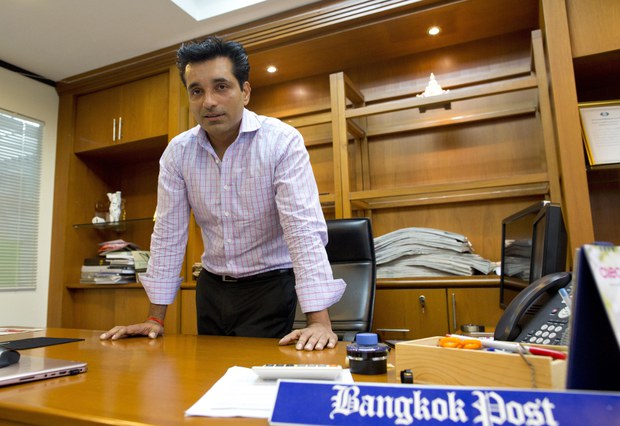Thailand: Bangkok Post Responds to Editor’s Claim about Interference from Junta
2018.05.16
Bangkok
 Umesh Pandey, sacked editor-in-chief of Bangkok Post newspaper poses for a photo in his former office in Bangkok, Thailand, May 15, 2018.
Umesh Pandey, sacked editor-in-chief of Bangkok Post newspaper poses for a photo in his former office in Bangkok, Thailand, May 15, 2018.
Thailand’s leading English daily, the Bangkok Post, assured readers Wednesday that its “editorial independence is intact” after the paper’s editor said he had been removed because the military government reportedly was not happy with his performance and after he refused to tone down his “hard hitting” stories.
Editor Umesh Pandey said he was transferred on Monday to an “insignificant position” after a 22-month stint at the top editorial post of the daily, which warned in an article last week that the upset opposition election victory in neighboring Malaysia should serve as “both a lesson and a warning” for the Thai junta which seized power in 2014.
“I was told that the people in the government were not happy with my work and that was shown through the board’s decision to put me on an inactive position,” Pandey told BenarNews in a telephone interview.
“I am not the first and I believe I am not the least one,” said Pandey. “But I hope I am the last one.”
Pandey said press freedom had suffered not only under current military rule but also even under the elected government of Prime Minister Thaksin Shinawatra during the 2001-2006 period.
“The hard-hitting news that we have produced in the 22-months of my leadership is a testament to what we as a team ... have managed to achieve,” he said.
The Bangkok Post said in a statement that it was committed to editorial autonomy, rejecting any notion that there was government interference in editorial issues.
“Following the transfer of former editor Umesh Pandey, the Bangkok Post would like to assure readers and the public of our editorial independence and reaffirm that our content, whether published in the newspaper or on other platforms, has never been interfered with by either the government or company executives,” it said.
“Despite the tough current climate in the media industry, the Bangkok Post remains committed to transparent journalism for the greater benefit of Thai society,” the statement said. “The paper confirms that everything produced under our name is congruent with our values of independence, integrity and impartiality.”
The paper also said that Umesh’s transfer was “the result of several factors and bears no relation to our journalistic autonomy or the content which we have produced proudly for almost 72 years.”
“At all times we have strived to maintain our integrity, even now in what is a challenging period for Thailand, but this newspaper has never compromised its editorial independence and this is something that will never change.”
Prime Minister General Prayuth Chan-o-cha, when asked to comment on the issue after a routine cabinet meeting said he appreciated “constructive” criticism but the removal of Umesh was an “ethical” issue that should be resolved by the media itself.
“What do I have to do with this? I don’t even know him. Who is Umesh Pandey? This is the issue of a private company, a matter of a news organization,” he said.
“I appreciate and don’t mind constructive criticism,” he said.
But U.S.-based Human Rights Watch said press freedom in Thailand was under threat “in a way that it has not been since the military government of the late 1970s.
It accused the military junta of dragging Thailand “backwards” in politics and reversing progress on human rights.
“One of the easiest ways to figure out who is violating press freedom in Thailand is the speed with which those responsible try to deny it -- which puts the denials from both the Bangkok Post and Prime Minister Prayut in perspective,” Phil Robertson, Deputy Asia Director of Human Rights Watch, told BenarNews.
He said the Bangkok Post’s majority owner was a huge business family that has “a very long track record of getting cozy with whoever is in power, and moderating the Post's editorial policy to fit with that objective.”
“Just like the Bangkok Post sacked a senior journalist who exposed corruption at the Suvarnaphumi airport in an expose that infuriated then PM Thaksin Shinawatra, now the owners stepped in to remove an editor who they obviously thought was too tough in holding the NCPO military government to their various public pledges to restore democracy.”







